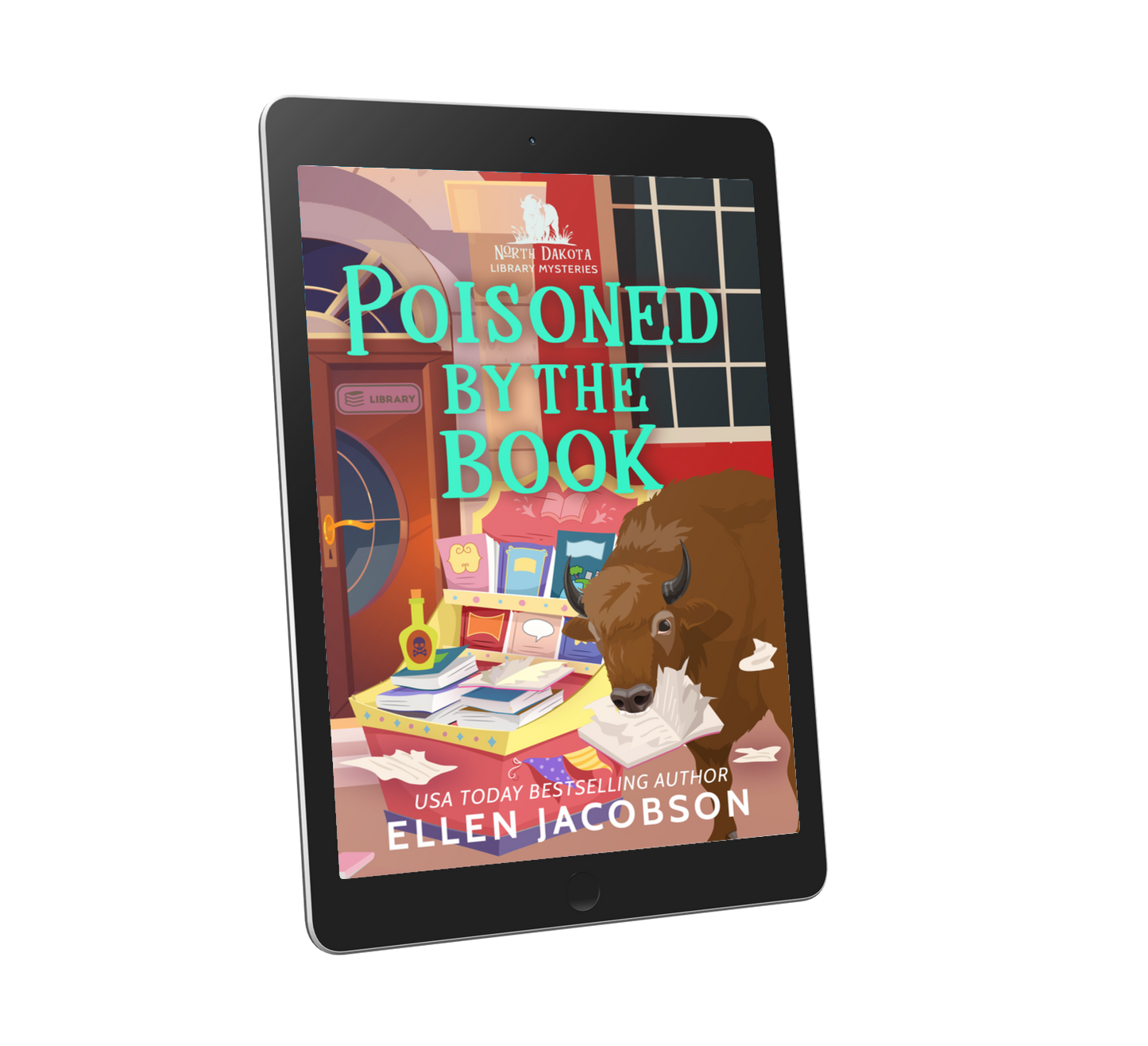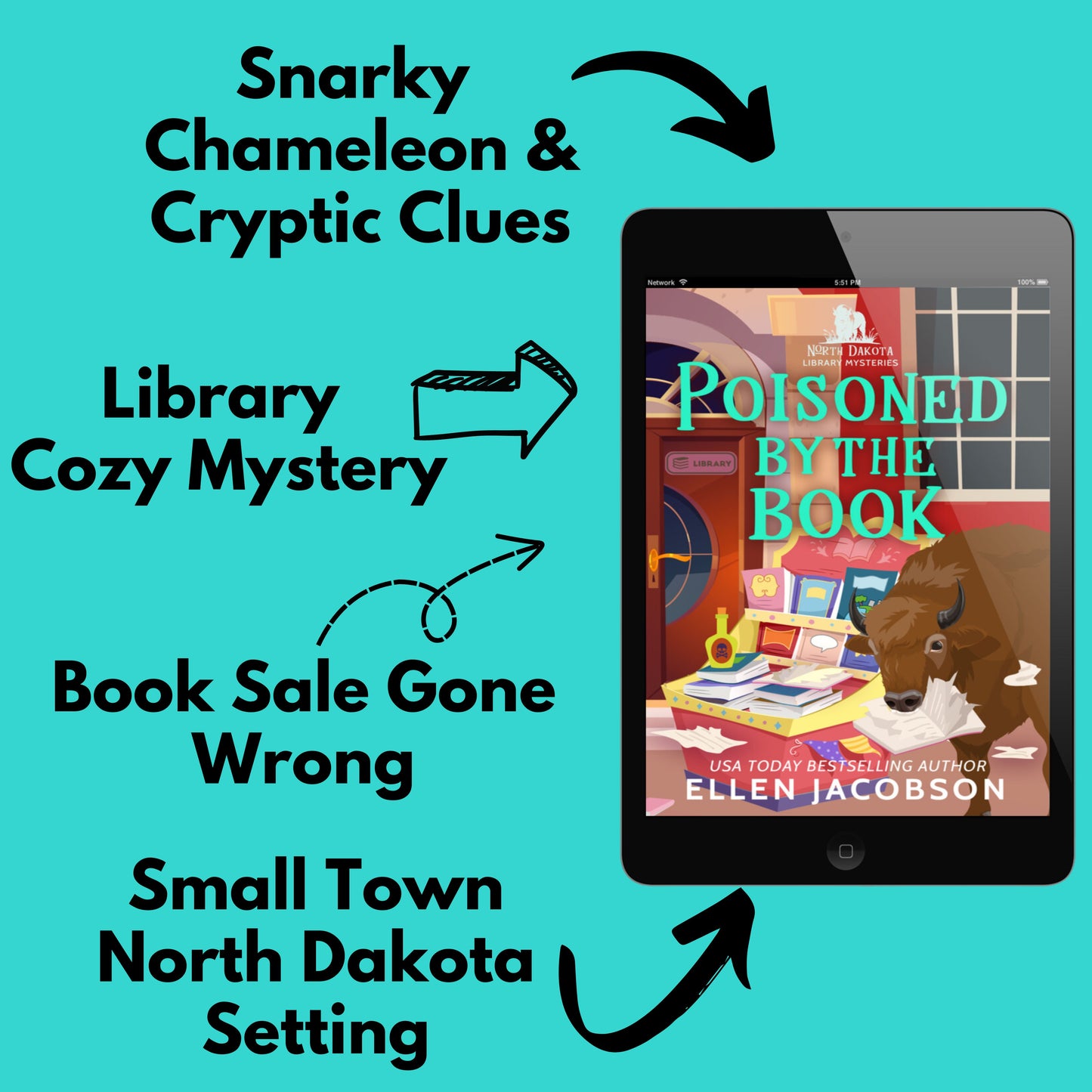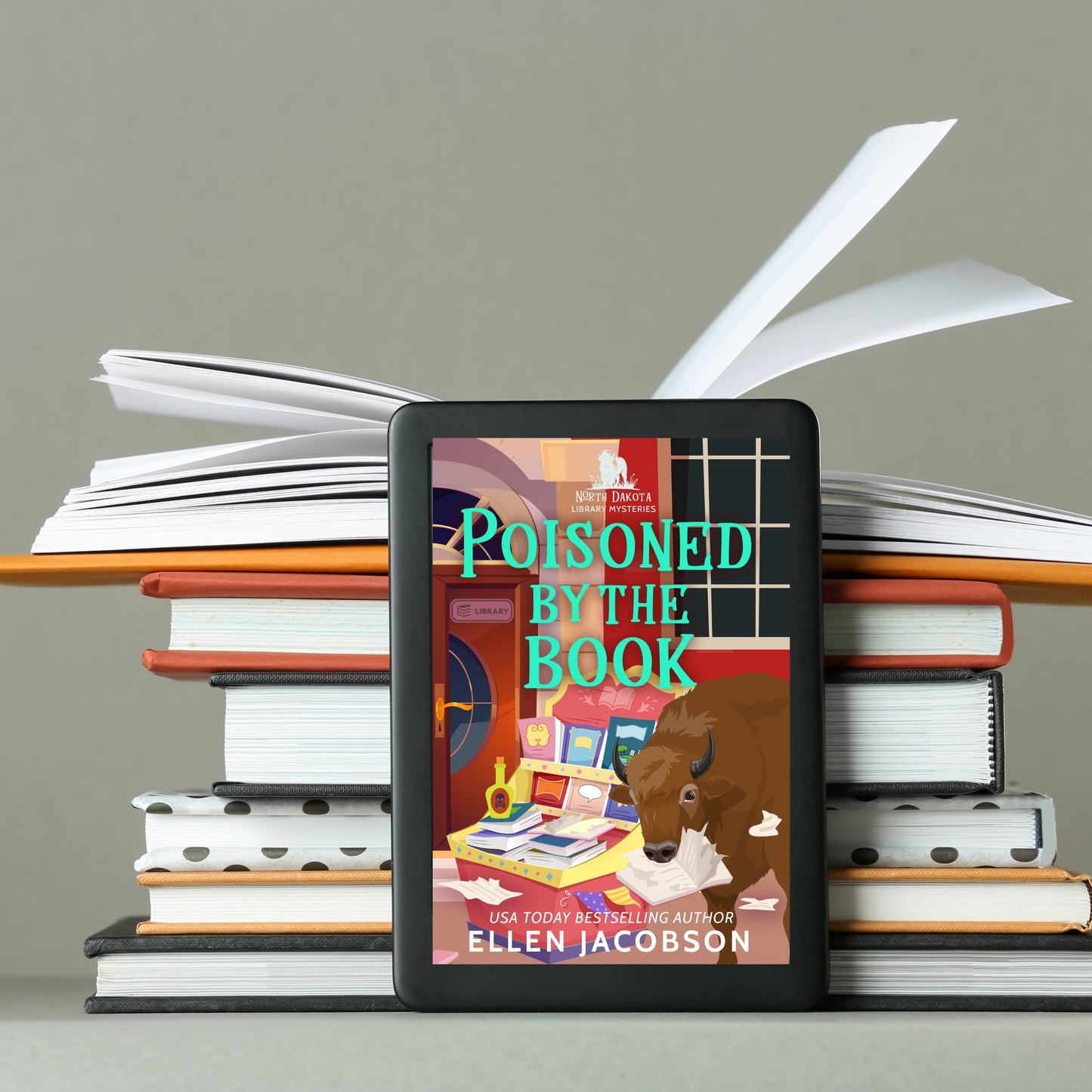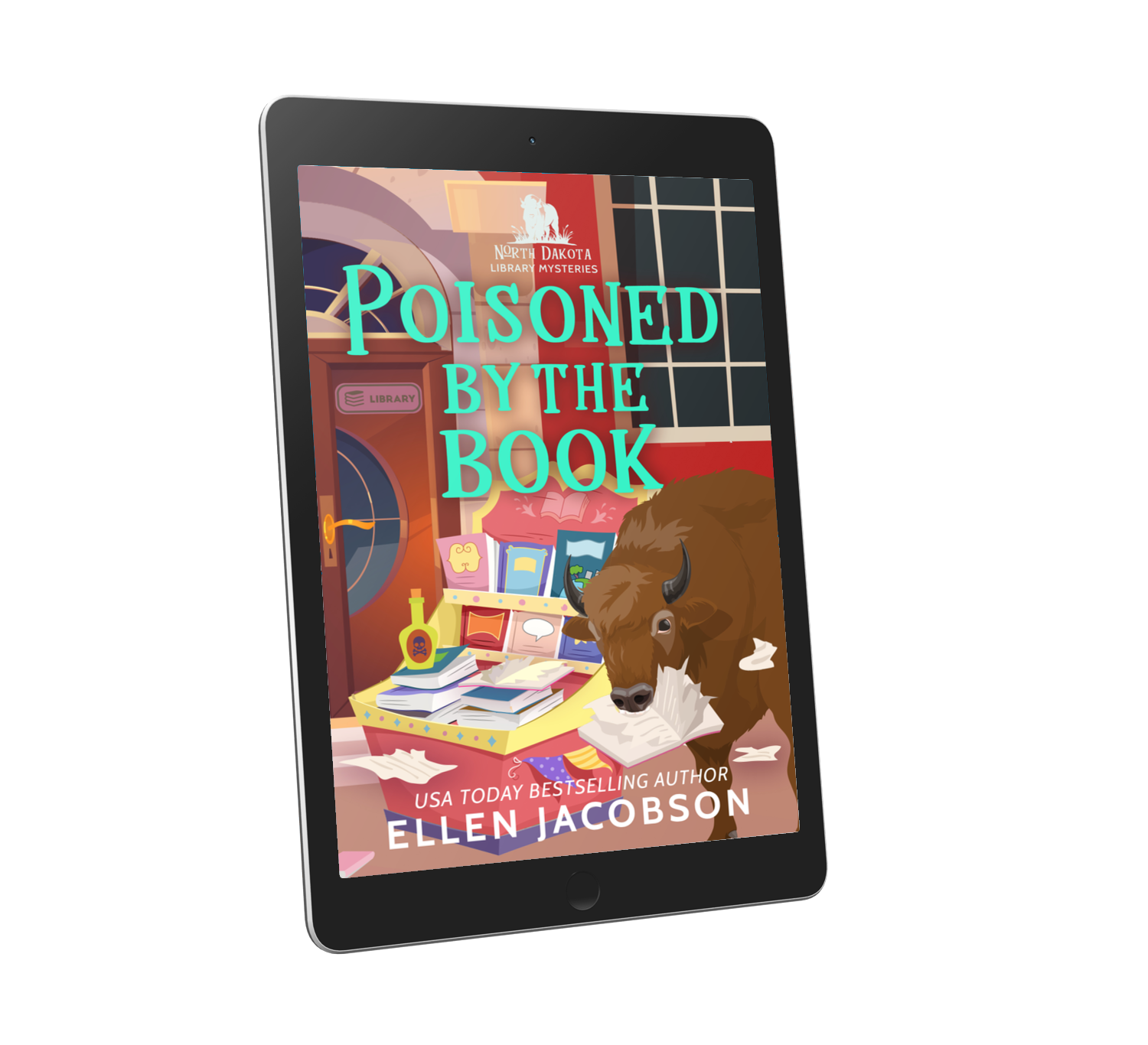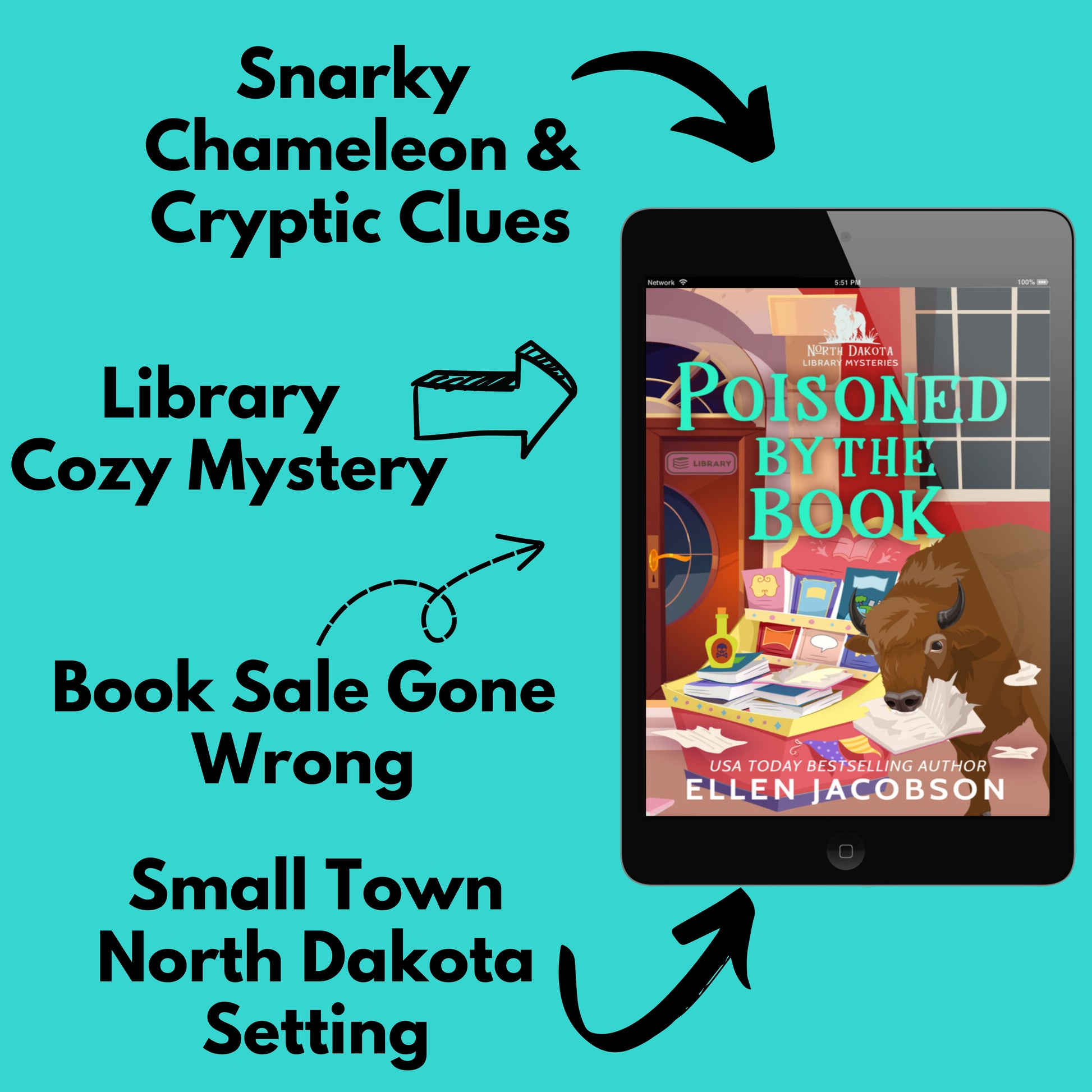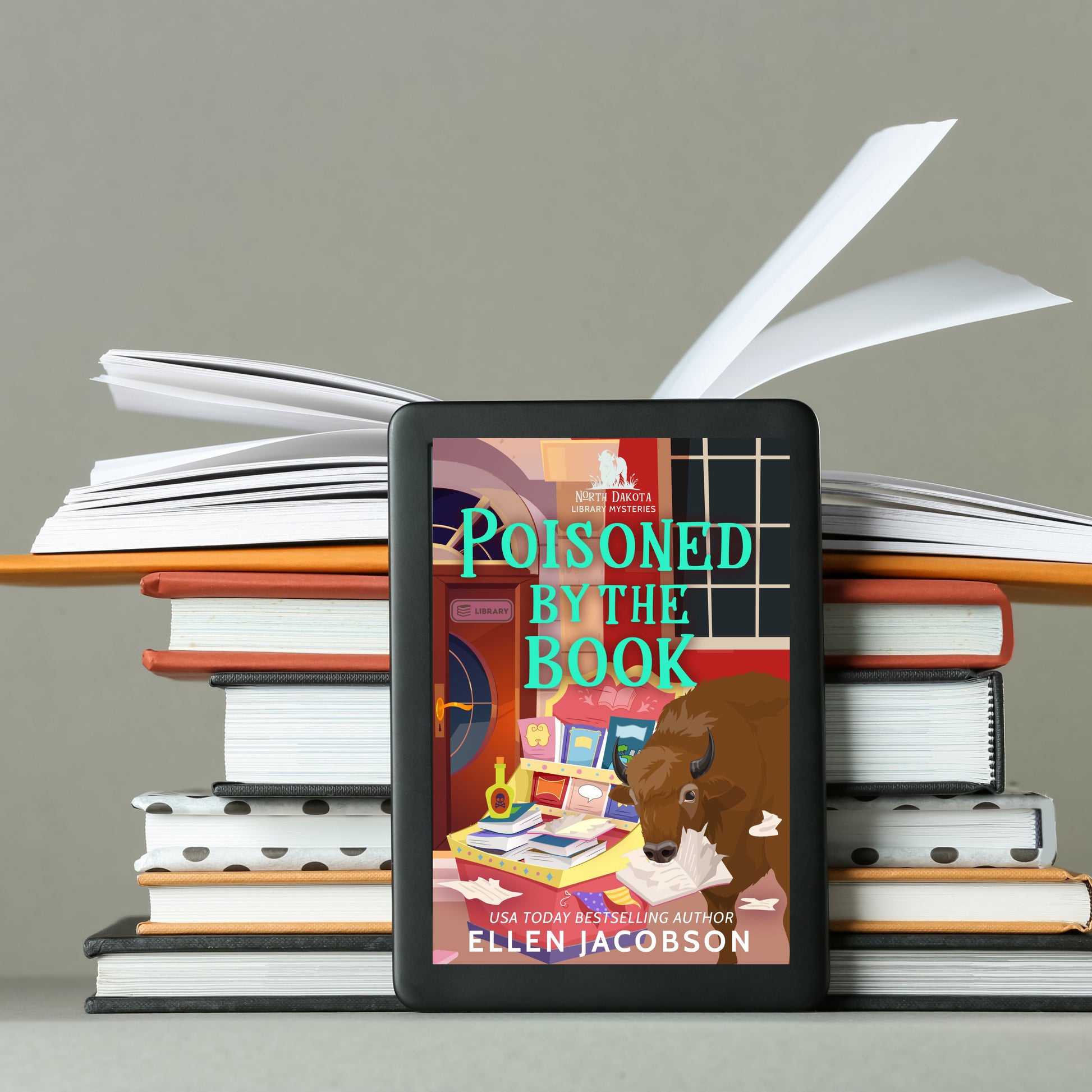Poisoned by the Book - North Dakota #2
Poisoned by the Book - North Dakota #2
Couldn't load pickup availability
- Purchase E-book Instantly
- Receive Download Link via Email
- Send to Preferred E-Reader and Enjoy!
North Dakota Library Mysteries - Book #2
Poisoned by the Book is the second book in a humorous cozy mystery series full of eccentric characters, North Dakota charm, and a pinch of paranormal mischief. Perfect for fans of bookish whodunits and critters with attitude.
EBOOK ALSO AVAILABLE AT:
Amazon | Barnes & Noble | Apple Books | Kobo | Google Play
PAPERBACK AVAILABLE AT:
LARGE PRINT AVAILABLE AT:
Why You'll Love This Book!
- Amateur Sleuth
- Quirky Characters
- North Dakota Setting
- Library Theme
- Way Too Much Coffee
- Clean Read - No Swearing, Violence, or Sex on the Page
Synopsis
Synopsis
Murder was never on the reading list.
Thea Olson loves her small North Dakota town, especially the library that’s at the heart of it. She’s happy to volunteer at the annual book fair, but when a prominent citizen is poisoned, the planning for this cozy event takes a chilling turn.
Armed with the sharp eye of her feisty grandmother, the reluctant help of the nerdy (and distractingly handsome) library director, and the sarcastic advice from an invisible chameleon only she can see, Thea sets out to prove it wasn’t an accident.
The police chief might not believe in foul play, but Thea’s gut says otherwise. The more suspects she interviews, the more secrets she uncovers—and someone will do anything to keep those secrets buried.
Can Thea solve the case before the killer writes a deadly final chapter?
Chapter 1 Look Inside
Chapter 1 Look Inside
Chapter 1 – Paper Cuts are the Worst
“Medic! I need a medic, here!” Ray Koch yelled, his normally deep voice shrill. The middle-aged man collapsed onto the carpeted floor, holding his right hand above his head. “The pain. It’s excruciating.”
“Thea, call nine-one-one,” my grandmother ordered as she rushed over to help Ray. Kneeling down next to the beefy man, Grandma gently laid a hand on his shoulder. “Where does it hurt? Is it your chest? Are you having a heart attack?” She spoke in soft and calm tones, reflecting her years of experience as a librarian in our small North Dakotan town before her retirement.
While I communicated with emergency services, I looked around the cramped room. Although it was the larger of the two library meeting rooms, it was jam-packed with boxes of used books—making it feel small and confining. With the annual book sale less than two weeks away, donations were coming in fast and furious. How were the EMTs going to fit in here with their equipment and stretcher?
“It’s not my heart, Rose. A heart attack would be a walk in the park compared to this,” Ray moaned as he thrust his fleshy hand in my grandmother’s direction.
After inspecting his finger, Grandma said dryly, “It’s only a paper cut, dear. Come on, get up. We’ll go find the first aid kit.”
Ray looked dubious. “Are you sure that’s all it is, darlin’?” His Texan accent seemed more pronounced than normal. Perhaps it was due to all the pain caused by the tiny cut on his finger.
“Yes, dear. I know a paper cut when I see one. Occupational hazard.” When Ray groaned as he got to his feet, she joked, “Don’t you think you’re being a little dramatic? Maybe instead of being president of the Garden Club, you should audition for the musical the theater group is putting on.”
Ray gave her a faint smile as Grandma looped her arm through his. She turned to look at me, and I said, “Already on it. Calling nine-one-one back.”
After explaining to emergency services they were no longer needed, I took a deep breath. Ray was such a hypochondriac. Odds were he wouldn’t be back to help with the book sale prep tonight, maybe not even the rest of the weekend. He’d probably milk his recovery from the paper cut for all it was worth too.
The library was already struggling to get enough volunteers for regular duties. Finding folks who wanted to work special events, such as the book sale, was proving near impossible. My grandmother had twisted Ray’s arm into spending his Friday night helping by tantalizing him with the promise of pizza and her famous rhubarb cookies once we had finished.
Now with Ray out of the picture, would we be able to get everything ready in time for the book sale? It was one of the main fundraisers of the year. With the recent budget cuts and fewer financial donations, the library was counting on it being a success.
A high-pitched, squeaky woman’s voice behind me interrupted my train of thought. “Here’s another one for you, Thea.”
I turned and smiled wearily as Cassidy Dahl set a cardboard box on one of the folding tables lining the walls. The table groaned under the weight, but luckily didn’t collapse. I glanced at broken laminate and metal pieces piled in the corner, proof there was a limit to how many boxes of books a table could hold.
“Thanks, I think.” I studied the other woman. The soft-spoken, lanky brunette was in her early twenties. The default expression on her flawlessly made-up face was one of utter boredom. Books held zero interest for her. Why she was volunteering at the library was a total mystery, but I was glad she was here.
“We really appreciate your help, especially on a Friday night.” As I grabbed a box cutter, I mentally cringed at my use of ‘we.’ It’s not like I was in charge of the place. Although, considering my family had founded the library in the late 1800s, I felt some sense of ownership.
Cassidy shrugged. “It’s not like there’s much else to do here on the weekends. I can’t wait until I save up enough to move to Minneapolis and go to cosmetology school.”
I couldn’t argue with her. Our small town of Why wasn’t exactly known for its nightlife. Sure, you could go bowling or to the movies, grab a pizza or burgers at one of the local joints, or take a drive to look at the wind turbines and oil derricks scattered in the fields around this part of western North Dakota. You could visit Bismarck or Fargo—they had more to offer. But if you wanted to eat at a fancy restaurant, do some serious shopping, see the Minnesota Twins play in person, hear live music, or check out nationally renowned cultural attractions, you needed to cross the state line. Minneapolis was where it was at. I should know, having lived there for several years before I moved back home.
On the other hand, life in Why had its positives. There were the usual things you find in small towns–a slower pace of life and a tight-knit community who looked out for each other. But we also had some unique attractions such as the taxidermy museum, my grandfather’s giant ball of twine, our annual Scandinavian festival, and a needy buffalo who wandered freely around town looking for handouts.
“I assumed a cute girl like you would have a date.” As soon as the words escaped my mouth, I grimaced. Could I sound any more ridiculous? Asking Cassidy why she wasn’t out with some guy made me sound like I was her mother. Not that I was old enough to have given birth to her. I was about seven, maybe eight years her senior. “Sorry. That made me sound so … um …”
“Old?” Cassidy suggested.
“Well, I was going to go with prying, but old sounds better. I think.” I held up my hands. “Your love life is your business.”
“Don’t worry. If I had one, I’d tell you all about it. But I don’t.” Cassidy grinned. “What about you? Why aren’t you out on a hot date?”
My cheeks grew warm as my thoughts drifted to Hudson Carter, the new library director and recent transplant from Florida. He certainly fell into the hot category with his unruly dark curly hair, an extensive collection of cardigans, and a vast knowledge of literature.
Okay, I realize that makes Hudson sound more nerdy than hot, but nerdiness can be hot, don’t you think? Is there anything sexier than a guy reading a book? Not that I’m aware of.
When Hudson moved to Why during the winter to take up the library director role after my grandmother retired, we had become friends. Good friends. The kind of friendship you only develop when you solve a murder together. But we would never be more than friends. The man was a widower, after all. After losing your wife and unborn child, are you ever ready to date again?
“Earth to Thea,” Cassidy said. “Thinking about someone in particular?”
“Of course not,” I said a little too quickly, using the box cutter to slice the packing tape open on a box. “Just wondering what’s inside here.”
Cassidy tucked her long hair behind her ears. “I bet it’s another set of dusty encyclopedias. It’s hard to believe that’s how people used to look stuff up back in the old days. Thank goodness we have our cell phones nowadays.”
I chuckled. “Don’t let my grandmother hear you say that. She’s rather fond of encyclopedias.”
“Well, sure. She’s a librarian,” Cassidy said. “They’re old-fashioned that way.”
Someone cleared their throat behind us. “Who are you calling old-fashioned?”
I spun around and saw my grandmother. She folded her arms across her chest, trying to repress a smile while giving Cassidy a stern look. Grandma looked neat and put together, as usual. Her light purple skirt, mint green blouse, and floral-patterned scarf hinted at the spring weather we all hoped was on its way to stay.
Cassidy’s cheeks reddened. “Oh, I’m so sorry, Mrs. Olson. I didn’t mean, um … for you to, um—”
“Just because I was born long before you doesn’t mean I’m old-fashioned,” my grandmother said, cutting Cassidy off. Then she furrowed her brow. “But maybe you can explain what a cell phone is to me. I’ve never heard of those. Sounds awfully strange. Is it made out of actual cells? Do they grow them in petri dishes?”
“Phones made out of living tissue?” The expression on Cassidy’s face conveyed a mix of utter confusion and shock. She pulled her own phone out of the pocket of her jeans and handed it to my grandmother. “No, they’re made out of plastic and metal.”
Grandma stared at Cassidy’s phone as though she had never seen such a contraption before. “How strange.”
Cassidy shot me a pleading look, and I put her out of her misery. “My grandmother is messing with you. She knows perfectly well what a cell phone is. You should see all the apps she has on hers. Scrabble and Wordle are her favorites.”
“Don’t forget my crossword puzzle app,” Grandma added and turned to Cassidy. “I’m sorry for teasing you. People always think librarians are stuck in the past. That’s not actually the case. We use technology just like the rest of the world. Of course, between you and me, I still think physical books are better than ebooks by a country mile.”
My grandmother handed Cassidy back her phone, and adjusted the silk scarf knotted around her neck. “Although I shouldn’t say ‘we.’ I’m not a librarian anymore,” she said glumly.
“Grandma, just because you’re retired doesn’t mean you’re not still a librarian,” I said.
“Thea is right,” a man agreed. I turned and saw Hudson in the doorway, adjusting the cartons stacked on his dolly. “Aren’t you the one who always says that librarians are the guardians of a community’s heart and soul? I’ve never met anyone who fits that description better than you. Being retired is simply your employment status. It’s not who you are.”
My grandmother beamed at Hudson as he pushed the dolly into the room. “You’re sweet.”
“That’s only because you feed me so many of your home-baked cookies. All that sugar is bound to make anyone sweet.” Hudson parked the hand cart next to one of the tables, then rubbed his stomach. “I’m starting to develop a paunch, though. Maybe middle age is setting in.”
“Middle age?” I scoffed. “Get out of here. You’re only a few years older than me, and there’s no way I’m middle-aged.”
“You might feel differently once you turn thirty,” Hudson said.
Ignoring Hudson’s comment about my upcoming birthday, I turned to my grandmother. “How’s Ray?”
“He’s fine. I got him a bandage, then brewed him some coffee. He’s sitting in the staff kitchen recuperating.”
Hudson furrowed his brow. “What happened?”
“A paper cut. Nothing to worry about.” Grandma rolled her eyes. “Although Ray did say he wasn’t sure if he’d be back this weekend. He needs to rest up his finger for gardening season.”
“I guess it’s just you and me,” I said to Cassidy.
“Uh-huh,” Cassidy said without looking up from her phone.
“I’ll make some calls and see if I can convince anyone else to help out.” Grandma inspected the boxes on the dolly. “Where did these come from?”
“Martha Lund donated them,” Hudson said. “She also said there’s more where these came from.”
As Hudson began lifting the boxes onto one of the tables, my grandmother and I exchanged glances. Martha willingly giving up her books? Not likely.
“Are you sure it was Martha who donated these books?” Grandma asked him.
“Yeah. She emailed me yesterday about it,” Hudson said. “She said she’ll bring more by next week. This was all she could fit in the trunk of her car, so it will take a few trips.”
“Martha drove here?” My grandmother shook her head. “No, that can’t be.”
“What did this woman look like?” I asked.
“I’m not good at describing people.” Hudson scratched his head. “I don’t know. She’s probably in her late thirties or early forties. Her hair is a dark auburn, and she wears it in loose curls. Let’s see, what else? She has really striking eyes. They’re green. Oh, and I loved her accent. Sounded like she’s originally from somewhere in the Caribbean.”
Grandma stared at Hudson. “That woman was not Martha Lund. Martha doesn’t drive anymore. She’s in her late eighties, of Norwegian descent, has silver hair, and the only striking thing about her eyes is the fact that she has cataracts.”
“Oh, I had assumed the woman in the car was Martha, but she was in a rush, so we only had a brief conversation,” Hudson said. “Maybe Martha had someone drop the boxes off for her?”
My grandmother pondered this. “Perhaps it was her new live-in nurse.”
“What happened to the last one?” I asked.
“The word around town is that Martha fired her after she borrowed one of Martha’s books without asking.” Grandma leaned forward and said in a conspiratorial tone, “But that wasn’t the worst of it. The gal had the audacity to dog-ear the pages.”
“Seriously? She fired someone over folding a piece of paper?” Cassidy scoffed.
My grandmother put her hand to her chest and gasped.
“Dog-earing pages is sacrilegious to serious book lovers,” Hudson explained to Cassidy.
“There’s a reason why bookmarks were invented,” Grandma stated primly. “You can grab a free one at the front desk.”
“You don’t have that problem when you read books on your phone,” Cassidy said. “No paper cuts, either.”
Before my grandmother could get on her soapbox about why physical books were superior to electronic ones, I interrupted. “Getting back to the lady who dropped off the books, it still doesn’t make any sense.”
“What do you mean?” Hudson asked.
“Martha is what you would call a hoarder when it comes to books,” I said.
“I prefer to think of her as a collector,” Grandma interjected.
“Okay, Martha is an avid collector,” I said. “But not the kind of collector who sells any of her books, let alone donates them. In fact, every year she comes to the book sale and buys new ones to add to her shelves.”
“This is completely out of character for Martha.” My grandmother frowned. “Something must be wrong.”
“It could be a mix-up,” I said. “Maybe it was someone else who emailed Hudson, someone with a similar name.”
“Let me check.” Hudson pulled out his phone, scrolled through his emails, and showed the screen to my grandmother.
“Well, that is Martha’s email address.” Grandma read the email, then her eyes widened. “Hang on a minute, what’s this at the bottom about her will?”
“Martha wants me to come see her on Monday to discuss leaving her estate to the library,” Hudson said. “We had a gentleman at my old library do something similar. It was a lovely gesture. When he passed away a few years later, we were able to purchase some new computers in his name.”
“Um, if Martha does leave the library her estate, you’ll be able to buy more than a few computers,” I said. “She’s one of the richest women in the state.”
Hudson’s jaw dropped. “Oh … okay, so not similar at all.”
“This makes no sense. Everyone knows that Martha’s niece will inherit. That’s been set in stone for years. She wouldn’t suddenly change her will.” Grandma locked eyes with me. “Thea, you need to go with Hudson on Monday and find out exactly what’s going on with Martha. I’m worried about her.”
“Don’t worry, we’ll get to the bottom of it. I’m sure the book donation and the will are a misunderstanding on both counts,” I said.
I squeezed my grandmother’s arm to reassure her, but I wasn’t sure it helped. Martha had a reputation for being a shrewd businesswoman and a meticulous record keeper. She wasn’t the kind of woman who would impulsively change her will. And she certainly wasn’t the type to donate her precious books to the library. Grandma was right—something was off.
